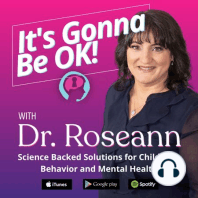4 min listen

134: What’s with my kid’s Disrespectful Behavior?
FromScience Backed Solutions for Children’s Behavior and Mental Health
134: What’s with my kid’s Disrespectful Behavior?
FromScience Backed Solutions for Children’s Behavior and Mental Health
ratings:
Length:
11 minutes
Released:
Oct 30, 2023
Format:
Podcast episode
Description
One of the significant challenges for many parents is managing the process of nurturing and raising children who display disrespectful behaviors. Such experience of dealing with a child who engages in backtalk and displays disrespectful conduct can be both disheartening and frustrating. As parents, we face the challenge of understanding why our child is behaving in a certain manner and figuring out how to guide them toward a more respectful and understanding demeanor. And so, in today’s episode, we address the challenge of dealing with the disrespectful behaviors of our child and the strain it can place on a relationship. Causes and solutions for child's disrespectful behavior.Understanding the root causes of disrespectful behavior is crucial before seeking solutions. This comprehension serves as the bedrock, offering profound insights into the complexities of the issue, ultimately guiding the development of well-informed and tailored approaches to address and rectify the behavior appropriately. This would show us a profound association with developmental stages and the powerful influence of parental behavior. Throughout the journey of growing up, children undergo various developmental phases, each marked by unique cognitive, emotional, and social changes. These developmental shifts can manifest as challenging behaviors, including disrespect, as children grapple with understanding their evolving identities and societal norms. Furthermore, children often closely observe and imitate the behavior of their parents or primary caregivers. They absorb and replicate the interactions, responses, and communication styles they witness within their family environment. Thus, parental behavior, whether respectful or otherwise, serves as a foundational template that significantly molds a child's attitudes, reactions, and conduct towards others. The environment in which a child is raised plays a pivotal role in shaping their behavior and demeanor. Hyper-vigilance, heightened awareness, and an increased state of alertness are often responses to chaotic or unstable surroundings. In such environments, children may find it challenging to regulate their emotions and reactions, leading to the manifestation of disrespectful behavior as a coping mechanism or a means of asserting control.A nurturing and understanding community can serve as a counterbalance to the chaos, providing a sense of stability, security, and guidance. When children are embraced by such a community, they gain exposure to inspiring role models, mentors, and peers capable of positively shaping their conduct. When children are enveloped in a supportive community, they have access to role models, mentors, and peers who can positively influence their behavior. ADHD behaviors and strategies for managing them.Children, regardless of having ADHD or not, often test boundaries as a normal part of their behavior. This testing of limits and guidelines is a fundamental aspect of their growth and exploration, an avenue through which they comprehend the rules set by the adults in their lives. The presence of clear, well-defined, and explicit boundaries significantly influences the frequency and intensity of these boundary-testing episodes. Effective communication of boundaries provides a roadmap for children to comprehend the parameters of acceptable behavior, contributing to a more harmonious interaction between children and the environments they engage with. When children have a comprehensive understanding of what is expected and what is deemed unacceptable, they are more likely to navigate within those boundaries with a sense of awareness and restraint. Attention-seeking behavior may stem from the brain's need for attention rather than intentional actions by the child. Overstimulation, whether sensory or environmental, can also trigger negative reactions in kids, especially when...
Released:
Oct 30, 2023
Format:
Podcast episode
Titles in the series (100)
It's Gonna Be Ok! by Science Backed Solutions for Children’s Behavior and Mental Health